Mlt ascp practice test 2 - Study guides, Class notes & Summaries
Looking for the best study guides, study notes and summaries about Mlt ascp practice test 2? On this page you'll find 40 study documents about Mlt ascp practice test 2.
Page 2 out of 40 results
Sort by
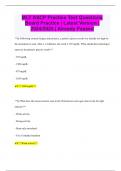
-
MLT ASCP Practice Test Questions Board Practice | Latest Version | 2024/2025 | Already Passed
- Exam (elaborations) • 63 pages • 2024
-
- $11.75
- + learn more
MLT ASCP Practice Test Questions Board Practice | Latest Version | 2024/2025 | Already Passed **Q: Following extreme fatigue and polyuria, a patient's glucose result was initially too high for the instrument to read. After a 1:4 dilution, the result is 325 mg/dL. What should the technologist report as the patient's glucose result?** - 325 mg/dL - 1300 mg/dL - 975 mg/dL - 1625 mg/dL **1300 mg/dL** **Q: What does the urease reaction seen in the Christensen's urea agar slant on t...
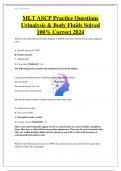
-
MLT ASCP Practice Questions Urinalysis & Body Fluids Solved 100% Correct 2024
- Exam (elaborations) • 25 pages • 2024
- Available in package deal
-
- $11.50
- + learn more
MLT ASCP Practice Questions Urinalysis & Body Fluids Solved 100% Correct 2024 Which of the following macroscopic findings is MOST consistent with the microscopic finding of casts? A. Specific gravity of 1.005 B. Positive protein C. Alkaline pH D. Clear urine [Answer: - B; The following factors promote the formation of casts in the kidney: Larger than normal amounts of plasma proteins entering the tubules Decreased pH Decreased urinary flow rate Increased urine concentration Iden...
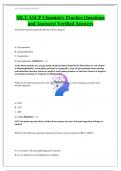
-
MLT ASCP Chemistry Practice Questions and Answers/ Verified Answers
- Exam (elaborations) • 22 pages • 2024
- Available in package deal
-
- $12.00
- + learn more
MLT ASCP Chemistry Practice Questions and Answers/ Verified Answers Acute phase proteins generally fall into which category? A. Glycoproteins B. Immunoglobulins C. Lipoproteins D. Microglobulins (Answer: - A; Acute phase proteins are a large group of glycoproteins found in the blood that are not related to immunoglobulins. Acute-phase proteins are generally a class of glycoproteins whose plasma concentrations increase, known as positive acute-phase proteins, or decrease, known as neg...
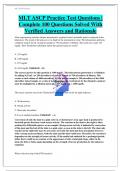
-
MLT ASCP Practice Test Questions | Complete 100 Questions Solved With Verified Answers and Rationale
- Exam (elaborations) • 35 pages • 2024
- Available in package deal
-
- $13.00
- + learn more
MLT ASCP Practice Test Questions | Complete 100 Questions Solved With Verified Answers and Rationale After experiencing extreme fatigue and polyuria, a patient's basic metabolic panel is analyzed in the laboratory. The result of the glucose is too high for the instrument to read. The laboratorian performs a dilution using 0.25 mL of patient sample to 750 microliters of diluent. The result now reads 325 mg/dL. How should the techologist report this patient's glucose result? A. 325 mg/dL B...
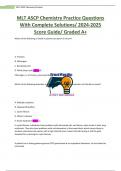
-
MLT ASCP Chemistry Practice Questions With Complete Solutions/ 2024-2025 Score Guide/ Graded A+
- Exam (elaborations) • 23 pages • 2024
-
Available in package deal
-
- $11.50
- + learn more
MLT ASCP Chemistry Practice Questions With Complete Solutions/ Score Guide/ Graded A+ Which of the following is found in plasma but absent in serum? A. Proteins B. Fibrinogen C. Red blood cells D. White blood cells [Ans: - B; Fibrinogen, is, of course, consumed during the clotting process. Which of the following disorders is characterized by increased production of chloride in sweat? A. Multiple myeloma B. Hypoparathyoidism C. Cystic fibrosis D. Wilson's disease E. Do...
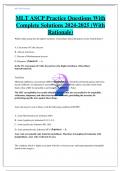
-
MLT ASCP Practice Questions With Complete Solutions 2024-2025 (With Rationale)
- Exam (elaborations) • 38 pages • 2024
- Available in package deal
-
- $14.00
- + learn more
MLT ASCP Practice Questions With Complete Solutions (With Rationale) Which ethnic group has the highest incidence of hereditary hemochromatosis in the United States? A. Caucasians of Celtic descent B. African Americans C. Persons of Mediterranean descent D. Hispanics (Answer: - A; In the US, Caucasians of Celtic descent have the highest incidence of hereditary hemochromatosis. True/False Minimum inhibitory concentration (MIC) susceptibility tests should be performed against other b...
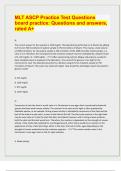
-
MLT ASCP Practice Test Questions board practice: Questions and answers,| LATEST UPDATE | EXAM PREDICTION QUESTIONS | rated A+
- Exam (elaborations) • 40 pages • 2024
-
Available in package deal
-
- $12.49
- + learn more
MLT ASCP Practice Test Questions board practice: Questions and answers, rated A+ B; The correct answer for this question is 1300 mg/dL. The laboratorian performed a 1:4 dilution by adding 0.25 mL (or 250 microliters) of patient sample to 750 microliters of diluent. This creates a total volume of 1000 microliters. So, the patient sample is 250 microliters of the 1000 microliter mixed sample, or a ratio of 1:4. Therefore, the result given by the chemistry analyzer must be multiplied by...
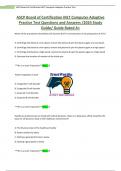
-
ASCP Board of Certification MLT Computer Adaptive Practice Test Questions and Answers /2024 Study Guide/ Guide Rated A+
- Exam (elaborations) • 33 pages • 2024
-
Available in package deal
-
- $17.50
- + learn more
ASCP Board of Certification MLT Computer Adaptive Practice Test Questions and Answers /2024 Study Guide/ Guide Rated A+ Which of the procedures listed below will increase the PLT concentration in the preparation of PLTs? A: Centrifuge the blood at a low speed, remove the plasma & spin the plasma again at a low speed. B: Centrifuge the blood at a low speed, remove the plasma & spin the plasma again at a high speed C: Centrifuge the blood at a high speed, remove the plasma & spin the plasma ...
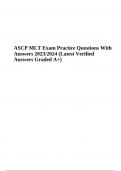
-
ASCP MLT Exam Practice Questions With 100% Correct Answers Latest Updated 2024 (Graded A+)
- Exam (elaborations) • 48 pages • 2024
-
Available in package deal
-
- $13.99
- + learn more
ASCP MLT Exam Practice Questions With 100% Correct Answers Updated 2024 (Graded A+) 1 unit or PRBC - answer Raises hemoglobin 1g and hematocrit 3% Leukoreduced RBCs - answer Less than 5 x 10^6 to prevent febrile non hemolytic reactions Cryoprecipitate - answer Factor 8 vWF Fibrinogen For DIC 6 hours Platelets 1unit - answer Irradiated blood - answer Prevent GVHD Ulex europaeus - answer Anti H lectin Dolichos biflorus - answer Anti A1 lectin Amount of H greatest to least - answer O A...
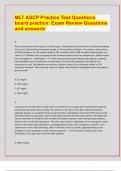
-
MLT ASCP Practice Test Questions board practice: Exam Review Questions | LATEST UPDATE | EXAM PREDICTION QUESTIONS | and answers/
- Exam (elaborations) • 40 pages • 2024
-
Available in package deal
-
- $11.49
- + learn more
MLT ASCP Practice Test Questions board practice: Exam Review Questions and answers/ B; The correct answer for this question is 1300 mg/dL. The laboratorian performed a 1:4 dilution by adding 0.25 mL (or 250 microliters) of patient sample to 750 microliters of diluent. This creates a total volume of 1000 microliters. So, the patient sample is 250 microliters of the 1000 microliter mixed sample, or a ratio of 1:4. Therefore, the result given by the chemistry analyzer must be multiplied...

$6.50 for your textbook summary multiplied by 100 fellow students... Do the math: that's a lot of money! Don't be a thief of your own wallet and start uploading yours now. Discover all about earning on Stuvia


